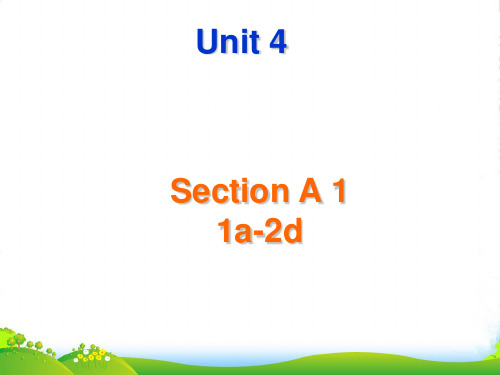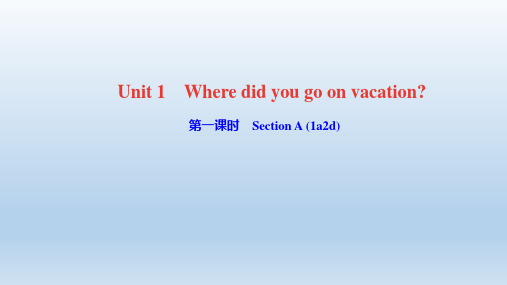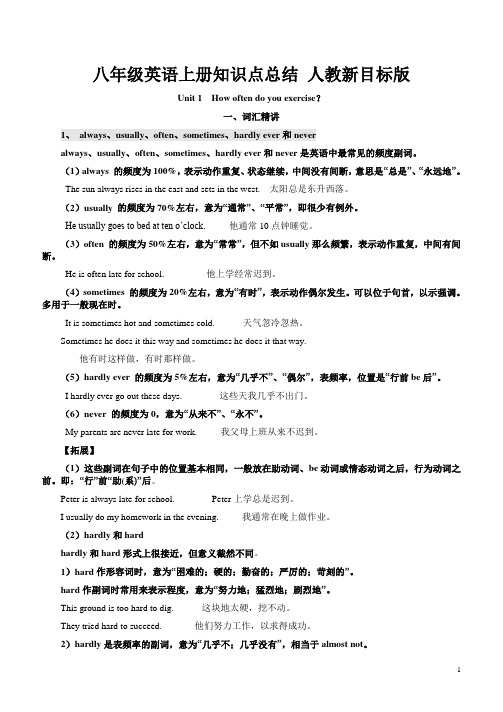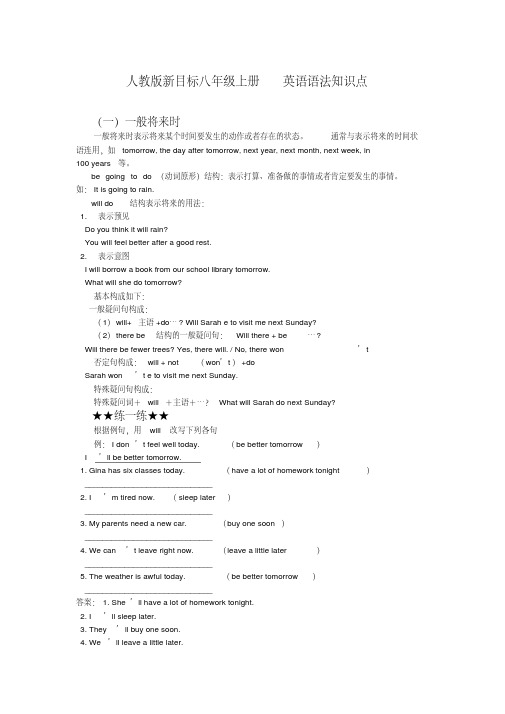2018届人教新目标英语中考常见知识必备课件:初中英语单词变形总览--八年级上册 (共19张PPT)
初中英语人教新目标八年级上册Unit 5单词详解

八年级英语上册Unit 5单词详解★sitcom(situation comedy)(C)n.情景喜剧→What do you think of sitcoms?你对情景喜剧怎么看?→Actually, my English teacher was a sitcom, Friends.(句子副词作评注状语)事实上,我的英文老师是一部情境喜剧,《老友记》。
★news(U)n.新闻节目,新闻;消息(强调“新”,information强调内容)◆newspaper(C)n.报纸①(广播,电视里的)新闻节目the news●watch /listen to the news看/听新闻节目②新闻(报道)●the sports news体育新闻③消息●a piece of news一条消息●no news is good news没有消息就是好消息●The good news is that……, the bad news is that……◆in the news 被报导(在新闻报道中出现)◆on the news 在广播或电视新闻中→Let’s watch the news. 我们看看新闻节目吧。
→Be quiet. I want to listen to the news.安静点,我要听听新闻。
→It must be true – I heard it on the news last night.这肯定是真的,我昨晚在新闻节目中听到的。
→Here’s the sports news from Jane Murray.下面是简·默里发来的体育新闻。
→I hope to have some good news for you soon.我希望很快就能给你好消息。
★soap opera肥皂剧(复合名词/可数名词)(以家庭问题为题材的广播或电视连续剧)●a bar of soap一块肥皂→Every night my roommates watch the Korean soap operas till mid-night.(介词“直到”)我的室友每天晚上都看韩剧到午夜。
人教版新目标初中英语八年级上册 Unit4 教学课件Section A 1a2d (共22张PPT)

1a Choose
How do you choose which movie theater to go to?
Write the things in the box.
Important
Not important
comfortable seats
close to home
big screens
cheap
most cheaply there.
970 AM 97.9 FM 107.9 FM _9_7_0__A_M___ It has the worst music. _9_7_._9_F_M___ They play the most boring songs. _1_0_7_.9__F_M__ The DJs choose songs the most
comfortable —— the most comfortable
(多音节词和部分双音节词前加 the most) good —— the best
bad/badly —— the worst
many/much —— the most 特殊变化的,需单独记忆)
cheaply —— (the) most cheaply carefully —— (the) most carefully
•11、凡为教者必期于达到不须教。对人以诚信,人不欺我;对事以诚信,事无不成。 •12、首先是教师品格的陶冶,行为的教育,然后才是专门知识和技能的训练。 •13、在教师手里操着幼年人的命运,便操着民族和人类的命运。2021/11/52021/11/5November 5, 2021 •14、孩子在快乐的时候,他学习任何东西都比较容易。 •15、纪律是集体的面貌,集体的声音,集体的动作,集体的表情,集体的信念。 •16、一个人所受的教育超过了自己的智力,这样的人才有学问。 •17、好奇是儿童的原始本性,感知会使儿童心灵升华,为其为了探究事物藏下本源。2021年11月2021/11/52021/11/52021/11/511/5/2021 •18、人自身有一种力量,用许多方式按照本人意愿控制和影响这种力量,一旦他这样做,就会影响到对他的教育和对他发生作用的环境。 2021/11/52021/11/5
初中英语八年级上册 全册Unit 1-10 课件 人教新目标版(付,1094)

A.Everyone B.Someone C.Anyone D.No one
C
( )13.—How was your vacation?
—________! I had a wonderful time there.
A.sounds B.seems
C.feels
D.smells
( C )15.The stories are very ________. And I'm ________ with them.
A.boring; boring B.bored; bored C.boring; bored D.bored; boring
二、根据句意,用所给词的适当形式填空。
6.—Are
there
anything __________(something)
interesting
in
this
shop?
—Yes. You can go and choose(选择) some gifts for your friends.
7.I saw many ____p_h_o_t_o_s(photo) on the wall of her bedroom.
something
for
his
parents,but
nothing __________for himself.
3.Nowadays I can choose online courses and study by _______m_.yself
4.Yesterday,his neighbor's ______h_elanisd(下蛋) four eggs altogether.
人教版八年级英语上册知识点总结(全)

八年级英语上册知识点总结人教新目标版Unit 1 How often do you exercise?一、词汇精讲1、always、usually、often、sometimes、hardly ever和neveralways、usually、often、sometimes、hardly ever和never是英语中最常见的频度副词。
(1)always 的频度为100%,表示动作重复、状态继续,中间没有间断,意思是“总是”、“永远地”。
The sun always rises in the east and sets in the west. 太阳总是东升西落。
(2)usually 的频度为70%左右,意为“通常”、“平常”,即很少有例外。
He usually goes to bed at ten o’clock. 他通常10点钟睡觉。
(3)often 的频度为50%左右,意为“常常”,但不如usually那么频繁,表示动作重复,中间有间断。
He is often late for school. 他上学经常迟到。
(4)sometimes 的频度为20%左右,意为“有时”,表示动作偶尔发生。
可以位于句首,以示强调。
多用于一般现在时。
It is sometimes hot and sometimes cold. 天气忽冷忽热。
Sometimes he does it this way and sometimes he does it that way.他有时这样做,有时那样做。
(5)hardly ever 的频度为5%左右,意为“几乎不”、“偶尔”,表频率,位置是“行前be后”。
I hardly ever go out these days. 这些天我几乎不出门。
(6)never 的频度为0,意为“从来不”、“永不”。
My parents are never late for work. 我父母上班从来不迟到。
人教版新目标八年级上册-英语语法知识点

人教版新目标八年级上册英语语法知识点(一)一般将来时一般将来时表示将来某个时间要发生的动作或者存在的状态。
通常与表示将来的时间状语连用,如tomorrow, the day after tomorrow, next year, next month, next week, in100 years等。
be going to do(动词原形)结构:表示打算、准备做的事情或者肯定要发生的事情。
如:It is going to rain.will do结构表示将来的用法:1. 表示预见Do you think it will rain?You will feel better after a good rest.2. 表示意图I will borrow a book from our school library tomorrow.What will she do tomorrow?基本构成如下:一般疑问句构成:(1)will+主语+do…? Will Sarah e to visit me next Sunday?(2)there be 结构的一般疑问句:Will there + be …?Will there be fewer trees? Yes, there will. / No, there won’t 否定句构成:will + not (won’t)+doSarah won’t e to visit me next Sunday.特殊疑问句构成:特殊疑问词+will+主语+…?What will Sarah do next Sunday?★★练一练★★根据例句,用will改写下列各句例:I don’t feel well today. (be better tomorrow)I’ll be better tomorrow.1. Gina has six classes today. (have a lot of homework tonight)_____________________________2. I’m tired now. (sleep later)_____________________________3. My parents need a new car. (buy one soon)_____________________________4. We can’t leave right now. (leave a little later)_____________________________5. The weather is awful today. (be better tomorrow)_____________________________答案:1. She’ll have a lot of homework tonight.2. I’ll sleep later.3. They’ll buy one soon.4. We’ll leave a little later.5. Maybe it’ll be better tomorrow.(二)should的用法:should用来提出建议和忠告,后边加动词原形,否定句直接在should后边加not.例如:I think you should eat less junk food.我认为你应该少吃垃圾食品。
最新人教版八年级英语上册知识点总结(全)

人教新目标版八年级英语上册知识点总结Unit 1 How often do you exercise?一、词汇精讲1、always、usually、often、sometimes、hardly ever和neveralways、usually、often、sometimes、hardly ever和never是英语中最常见的频度副词。
(1)always 的频度为100%,表示动作重复、状态继续,中间没有间断,意思是“总是”、“永远地”。
The sun always rises in the east and sets in the west. 太阳总是东升西落。
(2)usually 的频度为70%左右,意为“通常”、“平常”,即很少有例外。
He usually goes to bed at ten o’clock. 他通常10点钟睡觉。
(3)often 的频度为50%左右,意为“常常”,但不如usually那么频繁,表示动作重复,中间有间断。
He is often late for school. 他上学经常迟到。
(4)sometimes 的频度为20%左右,意为“有时”,表示动作偶尔发生。
可以位于句首,以示强调。
多用于一般现在时。
It is sometimes hot and sometimes cold. 天气忽冷忽热。
Sometimes he does it this way and sometimes he does it that way.他有时这样做,有时那样做。
(5)hardly ever 的频度为5%左右,意为“几乎不”、“偶尔”,表频率,位置是“行前be后”。
I hardly ever go out these days. 这些天我几乎不出门。
(6)never 的频度为0,意为“从来不”、“永不”。
My parents are never late for work. 我父母上班从来不迟到。
【新课标】2018最新版本初中英语中考总复习初中英语八大时态复习PPT课件
矿产资源开发利用方案编写内容要求及审查大纲
矿产资源开发利用方案编写内容要求及《矿产资源开发利用方案》审查大纲一、概述
㈠矿区位置、隶属关系和企业性质。
如为改扩建矿山, 应说明矿山现状、
特点及存在的主要问题。
㈡编制依据
(1简述项目前期工作进展情况及与有关方面对项目的意向性协议情况。
(2 列出开发利用方案编制所依据的主要基础性资料的名称。
如经储量管理部门认定的矿区地质勘探报告、选矿试验报告、加工利用试验报告、工程地质初评资料、矿区水文资料和供水资料等。
对改、扩建矿山应有生产实际资料, 如矿山总平面现状图、矿床开拓系统图、采场现状图和主要采选设备清单等。
二、矿产品需求现状和预测
㈠该矿产在国内需求情况和市场供应情况
1、矿产品现状及加工利用趋向。
2、国内近、远期的需求量及主要销向预测。
㈡产品价格分析
1、国内矿产品价格现状。
2、矿产品价格稳定性及变化趋势。
三、矿产资源概况
㈠矿区总体概况
1、矿区总体规划情况。
2、矿区矿产资源概况。
3、该设计与矿区总体开发的关系。
㈡该设计项目的资源概况
1、矿床地质及构造特征。
2、矿床开采技术条件及水文地质条件。
初中英语人教新目标八年级上册Unit1 单元知识点
八年级英语上册Unit1知识点【Useful expressions】1.go on vacation 去度假2.go shopping 购物3.go out 外出(娱乐)4.go to summer camp 去夏令营5.go to the beach 去海滩6.go to the mountains 去爬山7.buy sth.for sb.(= buy sb.sth.) 给某人买某物8.keep a diary 记日记9.nothing...but + V.(原形) 除了……之外什么都没有10.seem + (to be) + adj 看起来11.long time no see 好久不见12.most of the time 大多数时间13.study for tests 备考14.feed hens 喂母鸡15.quite a few 相当多;不少16.visit museums 参观博物馆17.visit my uncle 拜访我叔叔18.stay at home 待在家19.taste good 尝起来不错;taste + adj.尝起来……20.in the countryside 在乡下21.along the way 沿途22.another two hours(= two more hours) 另外两个小时23.because of 因为(后接名词代词动名词,because+从句)24.the next day 第二天25.feel like 有……的感觉;感受到,feel doing sth.想要做某事26.decide to do sth.决定做某事27.enjoy doing sth.喜欢做某事28.start doing sth.开始做某事=begin doing sth.29.stop doing sth.停止做某事区分:stop to do sth.停下来去做某事30.dislike doing sth.不喜欢做某事31.try doing sth.尝试做某事 / try to do sth.尽力做某事32.forget to do sth. 忘记去做某事 / forget doing sth 忘记做过某事33.so + adj + that + 从句如此……以至于……34.tell sb.(not) to do sth. 告诉某人(不要)做某事35.find out 查明;弄清e up 升起37.in the past 在过去38.take photos 照相39.too many people太多的人(too many+可数名词复数,too much+不可数名词,much too+形容词或副词)40.walk around 四处走走41.walk up to the top 走到顶部42.arrive in +大地点= get to= reach+地点名“到达......”arrive at +小地点(注:若后跟地点副词here/there/home, 介词需省略,如:arrive here; get home)43.rain hard 雨下得很大=rain heavily44.bring back 带回来45.jump up and down in excitement 兴奋地跳来跳去46.learn something important 学一些重要的东西47.have a fun time 过得很愉快;玩得非常开心48.in the shopping center 在购物中心49.keep doing sth.继续做某事50.go on 继续【Target sentences】1.— Where did you go on vacation?—I went to…2.—Did you…?—Yes, I did./ No, I didn’t.3.Oh, did you go anywhere interesting?4.We took quite a few photos there.5.I just stayed at home most of the time to read and relax.6.It was sunny and hot, so we decided to go to the beach near our hotel.7.I feel like I was a bird.8.What a difference a day makes!9.And because of the bad weather, we couldn’t see anything below.10.I really enjoyed walking around the town.11.We waited over an hour for the train because there were too many people.12.My legs were so tired that I wanted to stop.13.My classmates told me to keep going, so I went on.【Language points】1.Where did you go on vacation?on vacation度假;休假on vacation表示一种状态,其中vacation意为“假期”,与holiday同义。
(完整)新目标八年级上册英语语法知识点精讲+练习,推荐文档
新目标八年级上册英语语法知识点精讲+练习(一)一般将来时一般将来时表示将来某个时间要发生的动作或者存在的状态。
通常与表示将来的时间状语连用,如tomorrow, the day after tomorrow, n ext year, n ext mon th, n ext week, in 100 years 等。
be goi ng to do (动词原形)结构:表示打算、准备做的事情或者肯定要发生的事情。
如:It is goi ng to rain.will do结构表示将来的用法:1. 表示预见Do you think it will rain?You will feel better after a good rest.2. 表示意图I will borrow a book from our school library tomorrow.What will she do tomorrow?基本构成如下:一般疑问句构成:(1)will+ 主语+do …? Will Sarah come to visit me n ext Sun day?(2)there be 结构的一般疑问句:Will there + be …?Will there be fewer trees? Yes, there will. / No, there won 't否定句构成:will + n ot (wo n')t +doSarah won ' t come to visit me next Sun day.特殊疑问句构成:特殊疑问词+ will +主语+…?What will Sarah do next Su nday?★★练一练★★根据例句,用will改写下列各句例: I don ' t feel well today.(be better tomorrow )I ' II be better tomorrow1. Gina has six classes today. (have a lot of homework tonight )2. I ' m tired now( sleep later)3. My pare nts n eed a new car. (buy one soon)4. We can ' t leave right now. leave a little later)5. The weather is awful today. (be better tomorrow )答案:1. She ' ll have a lot of homework tonight.2. I ' ll sleep later.3. They ' ll buy one soon.4. We ' ll leave a little later.5. Maybe it ' ll be better tomorrow.(二)should 的用法:should用来提出建议和忠告,后边加动词原形,否定句直接在should后边加not.例如:I think you should eat less junk food.我认为你应该少吃垃圾食品。
人教版新目标初中英语八年级上册《Unit 4 How do you get to school》精品课件共18页文档
take a subway 乘地铁 take a subway to…
-How do you get to school? -I take a subway to school.
take a train 乘火车 take a train to…
-How do you get to school? -I take a train to school.
Read3a and answer the questions.
1.How far is it from his home to school? About 10 kilometers.
2.When does he get up? At 6:00.
3.How long does the bus ride take?
walk步行 walk to…
-How do you get to school? -I walk to school.
-How do you get to school? -I take a … to school. I ride a bike to school. I walk to school.
A.takes B.rides C.get ( )4.My brother often takes the bus ______school.
A.to B.at C.of 5.Tom takes a bus to school.
_____ ______Tom get to school? 6._____ _____ does it take?(多长时间、多久) 7. _____ _____is it? (多远?)
Test: ( )1._____do you get to school? –Take a bus.
